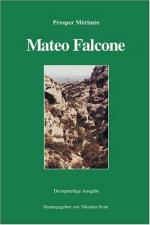|
This section contains 4 words (approx. 1 page at 400 words per page) |

|
Walter Pater, an English critic writing around 1880, called Merimee's fiction "intense, unrelieved, an art of fierce colours." "Mateo Falcone" has, in particular, provoked admiration. Pater, for example, thought it quite possibly "the cruellest story in the world," intending the description as a compliment.
Critics have cited the classical qualities of "Mateo Falcone," as in A. W. Raitt's 1970 comment that the story "obeys the unities as strictly as any classical tragedy." For Maxwell H. Smith (1972), the story represents Merimee's "first dazzling success" and constitutes a "brief tale condensed into a dozen pages . . . sufficient to confirm the literary reputation" of its creator.
Smith's reading of the tale exemplifies the typical interpretation, for Smith refers to "the tragic loneliness of Mateo after the sacrifice of his beloved son," a remark which subtly justifies the killing, at least, so to speak, in its context. The typical reading is thus one...
|
This section contains 4 words (approx. 1 page at 400 words per page) |

|




